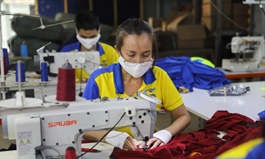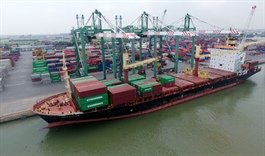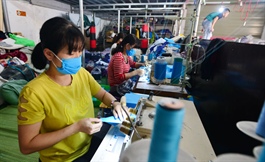FDI flows fly high amid pandemic uncertainties
FDI flows fly high amid pandemic uncertainties
Despite mounting challenges during reopening, foreign companies are still looking to step up investment in Vietnam, encouraged by the long-term prospects of the country and its moves to create a friendlier business climate.
There has been a landfall of new registered foreign investment figure in Vietnam in the past two weeks, with investors from Europe and Asia alike expanding their footprints to the country.
Singaporean insurer NTUC Income began expanding operations to Vietnam last week through a strategic partnership with Post and Telecommunication Joint Stock Insurance Corporation based on the insurance-as-a-service concept to supply customers with tailored insurance products, adjusted to when and how they need them.
NTUC Income’s key product Droplet provides weather insurance to clients who use ride-hailing platforms like Grab that pays out when prices go up due to rain.
Japanese investors are also actively expanding operations in Vietnam. Just last week, Rakuten Card Co., Ltd., a unit of Rakuten Group Inc., established Rakuten Fintech Vietnam Co., Ltd. to recruit local IT talents and develop its internal systems. Moving forward, the new subsidiary aspires to become a hub to develop Rakuten Group’s international fintech system, as well as increase client services.
Two weeks ago, Sojitz Corporation and Osaka Gas Co., Ltd. formed a new joint venture with Looop Inc., a Tokyo-based energy startup, to set up a rooftop solar company named SOL Energy in Vietnam. The new company will install rooftop solar panels on buildings at the Sojitz-operated Long Duc Industrial Park (IP) in the southern province of Dong Nai.
The group also plans to expand its solar business to other areas, including Long Binh Techno Park (also operated by Sojitz) in Dong Nai, where it aims to install solar power facilities before 2030.
Hirai Shinji, chief representative of the Japan Trade Promotion Organization in Ho Chi Minh City said, “The economic ties between Japan and Vietnam are expected to grow stronger as the Vietnamese economy develops. From looking at Vietnam as a production site to import parts and materials and re-export final products to Japan, more and more Japanese companies are starting to realise the opportunities in the growing local consumption market.”
Meanwhile, leading global fast-moving consumer goods player Hayat from Turkey has just opened a new production facility at Becamex Binh Phuoc IP, with plans to make the market its ASEAN hub.
Commenting on the deal, Thue Quist Thomasen, CEO of YouGov Vietnam said, “It is critical that Vietnam keeps a strong focus on creating the best possible conditions for foreign-invested enterprises as the country reopens. The successful investment of Hayat into Vietnam is a testament to the fact that conditions are improving.”
“European businesses are sustainable, innovative, and the best long-term partners for Vietnam. With the EU-Vietnam Free Trade Agreement, Vietnamese consumers will get access to world-class products while Vietnamese businesses will flourish from the access to the world’s biggest market,” he added.
Indeed, a recent report by Singapore Institute of International Affairs said Vietnam is still an attractive destination and the problems of 2021 do not mean that foreign investors will turn away.
Titled “From Crisis to Endemic: Stumbling or Pressing Ahead?” the report highlighted the resilience the Vietnamese economy showed at the macro level. Even amidst the pandemic, trade remained strong, with Vietnam’s total trade turnover growing 33.5 per cent on-year in the first five months of 2021.
The growth was supported by strong economic recoveries in major markets, especially the United States and China. It forecast that Vietnam would still attract some $30 billion in foreign direct investment (FDI) this year, 2 per cent more than last year. The report also noted that Vietnam’s investment environment remains prominent in the long term compared to other major ASEAN economies thanks to political stability.
According to the Ministry of Planning and Investment (MPI), despite the pandemic, inflows of both newly- and additionally-registered FDI increased in past months. Specifically, throughout the first 10 months, $13 billion of new foreign capital was registered, a rise of 11.6 per cent on-year, while capital expansion projects reached $7.1 billion, up 24.2 per cent on-year. As of October 20, the total accumulative registered FDI in Vietnam hit $404 billion.
Do Nhat Hoang, director general of the MPI’s Foreign Investment Agency, explained that FDI flows have recovered better than expected in 2021, driven by Vietnam’s solid long-term prospects and improving business climate. “Particularly, the number of new foreign-invested projects in labour-intensive industries like electronics, automobiles, and chemistry has reduced. Generally, there are fewer new and expanded projects, but the average valuations are higher due to the country’s selective FDI mobilisation policy,” said Hoang.
In early October, the prime minister issued Decision No.29/2021/QD-TTg, offering incentives to foreign investors meeting criteria on high technology, technology transfer, added value, and supporting local suppliers in joining manufacturing chains.


















